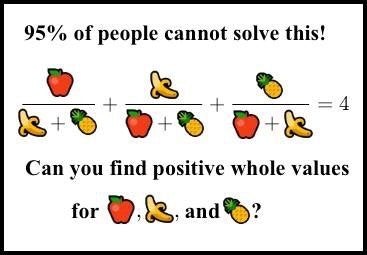はじめに
数学の問題を解いていたはずが、いつのまにかGCCの未定義動作の検出能力の発展を調べることになった話。
ディオファントス方程式
こんな問題を見つけた。
初出がどこかはよくわからないが、僕はこの記事で知った。
要するに
\frac{x}{y+z}+
\frac{y}{z+x}+
\frac{z}{x+y} = 4
の自然数解を求めなさい、という、典型的なディオファントス方程式である。
さて、僕はしばらく取り組んで見て解けなかったので、プログラムで探すことにした。ちょっとRubyで探したが見つからなかったので、「これは解が相当大きな数に違いない」と踏んで1、C++で探すことにした。
そのままプログラムにしてもいいが、どうせこういう問題は基本対称式使うんだろ、と、対称式でバラすことにした。
対称式にバラすのはMathematicaにやらせる。
In[1]:= Eliminate[{f == x/(y + z) + y/(z + x) + z/(x + y) - 4,
a == x + y + z, b == x y + y z + z x, c == x y z}, {x, y, z}]
Out[1]= c (-7 - f) == a^3 + a b (-6 - f)
ここから、
a^3 - 6 a b - 7c = 0
の自然数解を求める問題に帰着された2。これをそのままプログラムにするとこんな感じになるだろう。
# include <cstdio>
int
main(void){
const int max = 1000;
for(int x = 1; x < max;x++){
for(int y = 1; y < max;y++){
for(int z = 1; z < max;z++){
int a = x+y+z;
int b = x*y+y*z+z*x;
int c = x*y*z;
if (a*a*a - 6 * a * b == 7*c){
printf("%d %d %d\n",x,y,z);
}
}
}
}
}
ここまでが長い前置きであって、以下ではもう先のディオファントス方程式の話題は出てこない。この方程式にはちゃんと解があるので、数学の腕に覚えがある人は挑戦してみると面白いかもしれない。答と求め方は先の記事にある。
さて、このコードを、最適化オプション-O2以上でコンパイルすると、「未定義動作を伴うよ」と警告が出る。
$ g++ -O1 search.cpp
$ g++ -O2 search.cpp
search.cpp: In function ‘int main()’:
search.cpp:12:31: warning: iteration 307u invokes undefined behavior [-Waggressive-loop-optimizations]
if (a*a*a - 6 * a * b == 7*c){
^
search.cpp:6:3: note: containing loop
for(int x = 1; x < max;x++){
^
これは、7*cがintの値を超えちゃうよ、ということを警告している。clang++はこれを教えてくれない。
$ clang++ -O3 search.cpp
$
というわけで、どういう時に未定義動作を検出してくれるかをざっと調べてみた。
オーバーフローの検出
こんなコードを書いてみる。
# include <cstdio>
void
func(void){
for(int x = 0; x < 1000;x++){
for(int y = 0; y < 1000;y++){
for(int z = 0; z < 1000;z++){
if (3 * x * y * z % 2 == 0){
printf("%d %d %d\n",x,y,z);
}
}
}
}
}
これはGCCは未定義動作を検出してくれる。
$ g++ -O3 -c test1.cpp
test1.cpp: In function 'void func()':
test1.cpp:8:19: warning: iteration 718 invokes undefined behavior [-Waggressive-loop-optimizations]
if (3 * x * y * z % 2 == 0){
~~~~~~~~~~^~~
test1.cpp:5:20: note: within this loop
for(int x = 0; x < 1000;x++){
~~^~~~~~
ソースをちょっとだけ書き換えて見る。
# include <cstdio>
void
func(void){
for(int x = 0; x < 1000;x++){
for(int y = 0; y < 1000;y++){
for(int z = 0; z < 1000;z++){
// if (3 * x * y * z % 2 == 0){
if (3 * x * y * z % 2 == 1){
printf("%d %d %d\n",x,y,z);
}
}
}
}
}
3 * x * y * z % 2 == 0を3 * x * y * z % 2 == 1に変えただけなのだが、これは文句言ってくれない。
intをcharにしてみる。
# include <cstdio>
void
func(void){
for(char x = 0; x < 100;x++){
for(char y = 0; y < 100;y++){
for(char z = 0; z < 100;z++){
if (3 * x * y * z % 2 == 0){
printf("%d %d %d\n",x,y,z);
}
}
}
}
}
問題としてはintの場合と同様なことが起きそうなのだが、これもコンパイラは文句を言わない。
次に、intをshortにしてみる。
# include <cstdio>
void
func(void){
for(short x = 0; x < 1000;x++){
for(short y = 0; y < 1000;y++){
for(short z = 0; z < 1000;z++){
if (3 * x * y * z % 2 == 0){
printf("%d %d %d\n",x,y,z);
}
}
}
}
}
これは文句を言う。
$ g++ -O3 -c test4.cpp
test4.cpp: In function 'void func()':
test4.cpp:8:19: warning: iteration 718 invokes undefined behavior [-Waggressive-loop-optimizations]
if (3 * x * y * z % 2 == 0){
~~~~~~~~~~^~~
test4.cpp:5:22: note: within this loop
for(short x = 0; x < 1000;x++){
~~^~~~~~
これらの違いはアセンブリちゃんと読めばわかるんだろうけど、面倒なので見てない。
配列の領域外参照のチェック
GCCはループ内にある配列の領域外参照のチェックをしてくれる。
int a[10];
void
func(void){
for(int i=0;i<20;i++){
a[i] = i;
}
}
このチェックは-O1から有効になる。
$ g++ -O0 -c index1.cpp
$ g++ -O1 -c index1.cpp
index1.cpp: In function 'void func()':
index1.cpp:5:10: warning: iteration 10 invokes undefined behavior [-Waggressive-loop-optimizations]
a[i] = i;
~~~~~^~~
index1.cpp:4:16: note: within this loop
for(int i=0;i<20;i++){
~^~~
また、二重ループを使っても検出可能。
int a[10];
void
func(void){
for(int j=0;j<4;j++){
for(int i=0;i<4;i++){
a[i+ j*4] = i;
}
}
}
$ g++ -O1 -c index2.cpp
index2.cpp: In function 'void func()':
index2.cpp:6:17: warning: iteration 2 invokes undefined behavior [-Waggressive-loop-optimizations]
a[i+ j*4] = i;
~~~~~~~~~~^~~
index2.cpp:4:16: note: within this loop
for(int j=0;j<4;j++){
~^~
三重ループの検出は-O3から。
int a[10];
void
func(void){
for(int k=0;k<4;k++){
for(int j=0;j<4;j++){
for(int i=0;i<4;i++){
a[i+ j*4 + k*16] = i;
}
}
}
}
$ g++ -O2 -c index3.cpp
$ g++ -O3 -c index3.cpp
index3.cpp: In function 'void func()':
index3.cpp:7:26: warning: iteration 3 invokes undefined behavior [-Waggressive-loop-optimizations]
a[i+ j*4 + k*16] = i;
~~~~~~~~~~~~~~~~~^~~
index3.cpp:5:18: note: within this loop
for(int j=0;j<4;j++){
~^~
index3.cpp:7:26: warning: iteration 1 invokes undefined behavior [-Waggressive-loop-optimizations]
a[i+ j*4 + k*16] = i;
~~~~~~~~~~~~~~~~~^~~
index3.cpp:4:16: note: within this loop
for(int k=0;k<4;k++){
~^~
二次元配列で、単純連続アクセスとならない場合も、-O3で検出される。
int a[10];
void
func(void){
for(int j=0;j<10;j++){
for(int i=0;i<10;i++){
a[i+ j] = i;
}
}
}
$ g++ -O2 -c index2b.cpp
$ g++ -O3 -c index2b.cpp
index2b.cpp: In function 'void func()':
index2b.cpp:6:15: warning: iteration 9 invokes undefined behavior [-Waggressive-loop-optimizations]
a[i+ j] = i;
~~~~~~~~^~~
index2b.cpp:4:16: note: within this loop
for(int j=0;j<10;j++){
~^~~
まとめ
GCCはループ変形時に、変数のオーバーフローや、配列の領域外参照を検出すると教えてくれる(こともある)。上記の全てのコードについて、clang++は何も言ってくれない。
おまけ
上記の警告はあくまでループ変形に伴うものなので、以下のような自明な領域外参照については何も言ってくれない。
int
func(void){
int a[10];
return a[11];
}
$ g++ -O3 -c index4.cpp
$
ただし、上記のソースは-O2以上の最適化オプションと-Warray-boundsが指定された場合には指摘してくれる。
$ g++ -O1 -Warray-bounds -c index4.cpp
$ g++ -O2 -Warray-bounds -c index4.cpp
index4.cpp: In function 'int func()':
index4.cpp:4:14: warning: array subscript is above array bounds [-Warray-bounds]
return a[11];
~~~~^
ちなみにclang++はオプション無しに警告してくれる。
$ clang++ -c index4.cpp
index4.cpp:4:10: warning: array index 11 is past the end of the array (which
contains 10 elements) [-Warray-bounds]
return a[11];
^ ~~
index4.cpp:3:3: note: array 'a' declared here
int a[10];
^
1 warning generated.
